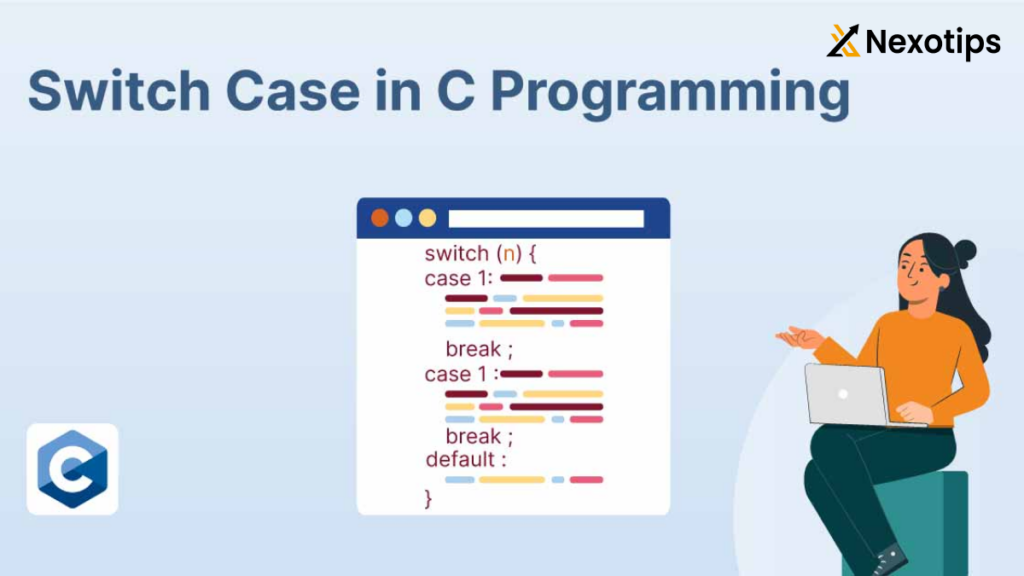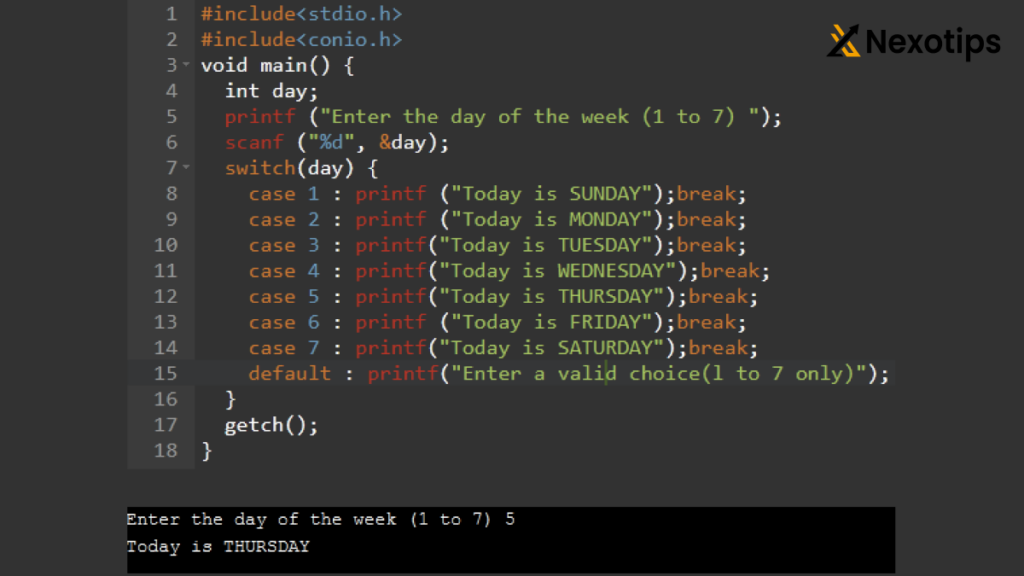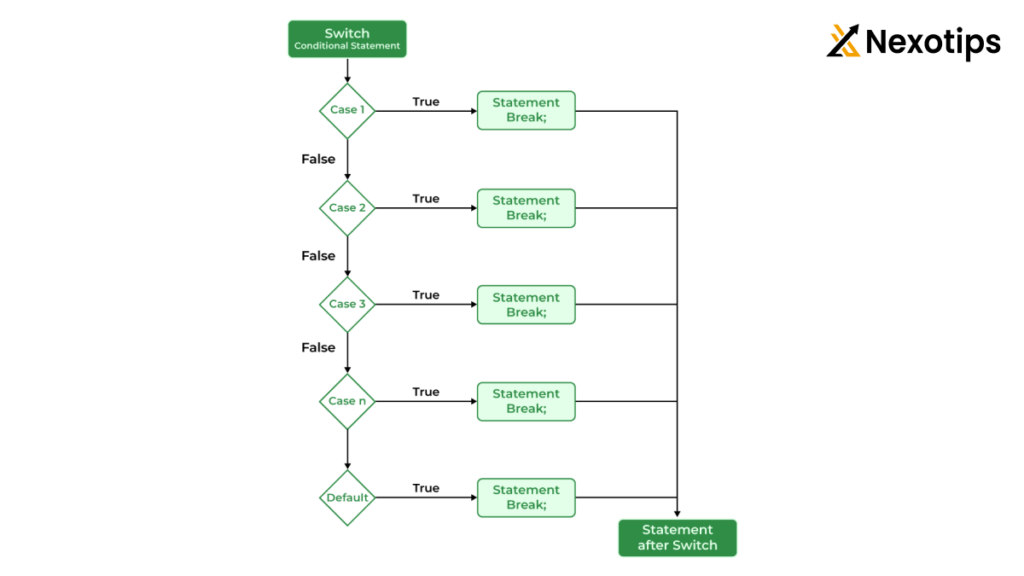
Switch Case in C Programming: A Comprehensive Guide.
The switch case is an essential control statement in C programming that allows a variable to be tested against a list of values. Every value is referred to as a case, and for every case, the variable that is being turned on is examined. It provides an efficient way to dispatch execution to different parts of code based on the value of a variable or expression. This blog post delves into the intricacies of the switch statement in C, illustrating its usage, benefits, and best practices.
Table of Contents
1. Introduction to Switch Case
In C programming, decision-making structures control the flow of execution based on certain conditions. Among these structures, the switch case statement is particularly useful when you have multiple conditions to check against a single variable. It simplifies the code and enhances readability, especially when compared to a long series of if-else-if statements.

2. Syntax of Switch Case
The syntax of the statement in C is straightforward:
switch (expression) {
case constant1:
// statements
break;
case constant2:
// statements
break;
...
default:
// default statements
}Key Points:
switch: The keyword that introduces the switch statement.expression: The variable or expression whose value is compared against the constants.case: Each possible value of the expression is checked using a case label.constant: A constant value that the expression is compared against.break: The break statement terminates the case block and exits the switch statement.default: An optional case that executes if none of the case values match the expression.
3. Working Mechanism of Switch Case
When the switch statement is executed, the expression is evaluated once. With every case label, the expression’s value is compared. If there is a match, the corresponding block of code is executed until a break statement is encountered. If no case matches the expression, the default case (if present) is executed.
Example:
#include <stdio.h>
int main() {
int day = 3;
switch (day) {
case 1:
printf("Monday\n");
break;
case 2:
printf("Tuesday\n");
break;
case 3:
printf("Wednesday\n");
break;
case 4:
printf("Thursday\n");
break;
case 5:
printf("Friday\n");
break;
case 6:
printf("Saturday\n");
break;
case 7:
printf("Sunday\n");
break;
default:
printf("Invalid day\n");
}
return 0;
}In this example, the variable day is compared against the values in the case labels. Since day is 3, the output is “Wednesday”.
4. Examples of Switch Case
Example 1: Simple Calculator
#include <stdio.h>
int main() {
char operator;
double num1, num2;
printf("Enter an operator (+, -, *, /): ");
scanf("%c", &operator);
printf("Enter two operands: ");
scanf("%lf %lf", &num1, &num2);
switch (operator) {
case '+':
printf("%.2lf + %.2lf = %.2lf\n", num1, num2, num1 + num2);
break;
case '-':
printf("%.2lf - %.2lf = %.2lf\n", num1, num2, num1 - num2);
break;
case '*':
printf("%.2lf * %.2lf = %.2lf\n", num1, num2, num1 * num2);
break;
case '/':
if (num2 != 0.0)
printf("%.2lf / %.2lf = %.2lf\n", num1, num2, num1 / num2);
else
printf("Division by zero error!\n");
break;
default:
printf("Invalid operator\n");
}
return 0;
}Example 2: Grading System
#include <stdio.h>
int main() {
char grade;
printf("Enter your grade (A, B, C, D, F): ");
scanf("%c", &grade);
switch (grade) {
case 'A':
printf("Excellent!\n");
break;
case 'B':
printf("Good\n");
break;
case 'C':
printf("Average\n");
break;
case 'D':
printf("Below Average\n");
break;
case 'F':
printf("Fail\n");
break;
default:
printf("Invalid grade\n");
}
return 0;
}5. Switch Case vs. If-Else Ladder
While both switch case and if-else ladder can be used for decision-making, there are significant differences between them.
Readability
Statements are more readable when you have to select among many possible values of a single expression. If-else ladders can become cumbersome and harder to read with multiple conditions.
Performance
Statements can be more efficient than if-else ladders because they use a jump table in the compiled code, making the selection faster.
Flexibility
If-else statements are more flexible as they can evaluate different expressions in each condition. Switch statements are limited to evaluating a single expression.
Example Comparison
Using switch case:
switch (value) {
case 1:
// code
break;
case 2:
// code
break;
default:
// code
}Using if-else:
if (value == 1) {
// code
} else if (value == 2) {
// code
} else {
// code
}
6. Nested Switch Case
Switch cases can be nested within one another, though this can make the code complex and harder to debug.
Example:
#include <stdio.h>
int main() {
int num1 = 1, num2 = 2;
switch (num1) {
case 1:
switch (num2) {
case 2:
printf("num1 is 1 and num2 is 2\n");
break;
default:
printf("num1 is 1 and num2 is not 2\n");
}
break;
default:
printf("num1 is not 1\n");
}
return 0;
}In this example, the outer switch checks num1, and if it is 1, the inner switch checks num2.
7. Common Mistakes and Pitfalls
Missing Break Statement
One of the most common mistakes is forgetting the break statement at the end of each case. Without break, the program will continue to execute the following cases, a behavior known as “fall through”.
Example of Fall Through:
switch (value) {
case 1:
// code for case 1
case 2:
// code for case 2
default:
// default code
}In this example, if value is 1, the code for case 1, case 2, and the default case will all be executed.
Unreachable Code
Another mistake is placing code after the default label that is unreachable due to a preceding break or return statement.
Example:
switch (value) {
case 1:
// code
break;
default:
// default code
break;
// Unreachable code
case 2:
// code
}8. Best Practices for Using Switch Case
Use Break Statements
Always use break statements at the end of each case to prevent fall through unless intentionally designed.
Use Default Case
Always include a default case to handle unexpected values, making your code more robust and error-proof.
Limit Nested Switch Cases
Avoid deep nesting of switch cases to maintain readability and simplicity.
Commenting
Add comments to explain the purpose of each case, especially in complex switch statements.
Example of Best Practices:
switch (grade) {
case 'A':
printf("Excellent\n");
break;
case 'B':
printf("Good\n");
break;
case 'C':
printf("Average\n");
break;
case 'D':
printf("Below Average\n");
break;
case 'F':
printf("Fail\n");
break;
default:
printf("Invalid grade\n");
}
9. Advanced Switch Case Techniques
Using Enums with Switch Case
One technique to define a set of named integer constants is with enums. They can be used with switch cases to make code more readable.
Example:
#include<stdio.h>enum Day { Monday, Tuesday, Wednesday, Thursday, Friday, Saturday, Sunday };int main() {
enum Day today = Wednesday;switch (today) {
case Monday:
printf("Today is Monday\n");
break;
case Tuesday:
printf("Today is Tuesday\n");
break;
case Wednesday:
printf("Today is Wednesday\n");Conclusion
The switch case statement in C programming is a powerful tool for controlling the flow of execution based on the value of a single variable. It offers a more readable and efficient alternative to lengthy if-else ladders, making it a valuable construct for developers. By understanding the syntax, working mechanisms, and best practices, programmers can leverage switch cases to write clearer and more maintainable code. Remember to always include break statements to prevent fall-through, use default cases to handle unexpected values, and avoid excessive nesting to keep your code simple and readable. By incorporating these techniques and strategies, you can effectively utilize switch cases to enhance your C programming projects.
Others: Understanding If-Else Statements In C Programming
